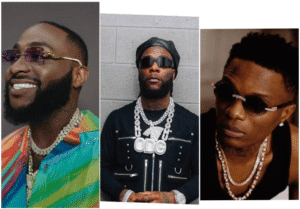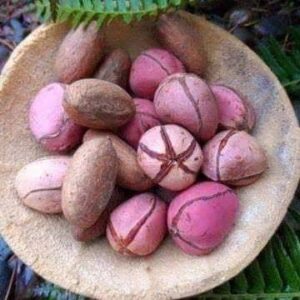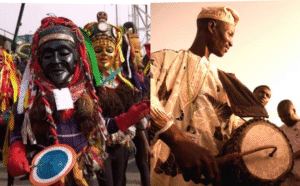There’s something unmistakably magical about a Nigerian traditional wedding. It’s not just an event — it’s a celebration of culture, community, colour, and deep-rooted values. From the rhythmic drumbeats that echo through the air to the richly embroidered attires that dazzle under the sun, these weddings are more than ceremonies — they’re living expressions of heritage.
Whether you’re a Nigerian in the diaspora hoping to reconnect with your roots or someone attending a traditional wedding for the first time, you’re in for an unforgettable experience. But beyond the music, food, and flamboyant outfits lies a layered tapestry of meaning, rituals, and family connections that make these weddings truly unique.
In this blog post, we’ll take a journey through the different stages of a Nigerian traditional wedding — from the early family introductions to the final celebrations. We’ll explore the symbolism behind the rituals, the roles of key figures, the differences across regions, and how modern touches now blend with ancient customs.
By the end, you’ll not only know what happens, but why it matters — and hopefully come away with a deeper appreciation for one of Nigeria’s most cherished cultural ceremonies.
Let’s dive in.
The Proposal & Family Introduction (Iku Aka / Knocking)
Before the glamour of the traditional wedding day, there’s a quiet but deeply important beginning — the family introduction, often known as “Iku Aka” among the Igbo or “knocking on the door” in general Nigerian culture. This stage is not just a formality; it’s the cultural equivalent of saying, “We come in peace — and with intention.”
A Visit of Respect and Intentions
In most Nigerian cultures, marriage is not just a union between two individuals — it’s a bond between two families. So, the process typically begins when the groom, accompanied by a few male elders from his family, visits the bride’s family home to formally declare his interest in marrying their daughter.
This is not a proposal in the Western sense. There’s no getting down on one knee. Instead, it’s a respectful request from one family to another — seeking to open the door to deeper discussions and relationships.
In the Igbo culture, this stage is called “Iku Aka” (literally, knocking on the door). In Yoruba tradition, a similar visit is done as part of the “Introduction”, where both families meet and begin to discuss the possibility of marriage.
Symbolic Gifts — Small but Significant
At this stage, the groom’s family often brings a few symbolic gifts to the bride’s home. These may include:
- A bottle of palm wine or schnapps
- Kolanuts
- Soft drinks or wine
- Dry gin (especially in Igbo land)
- Packs of sweets or biscuits
These items are not extravagant, but they carry meaning — respect, goodwill, and cultural honour.
The kolanut, for example, is a powerful symbol in many Nigerian traditions. It represents unity, peace, and hospitality. Offering kolanuts during such meetings is a way of saying, “We come together in peace and hope for a lasting relationship.”
Consent from the Heart of the Home
This initial visit also sets the tone for everything that follows. If the bride’s family accepts the visit, smiles all around. It means the door has officially been opened — but there’s still more to come. The families will usually schedule another visit or engagement ceremony, where deeper discussions (like bride price, date selection, and expectations) will take place.
Importantly, while the families are involved, the voice of the bride still matters. If she says no, the conversation ends there. Her consent is crucial. Even in deeply traditional homes, a woman’s voice in this process is respected, if not always loudly heard.
The Traditional Engagement Ceremony
If the family introduction is the quiet handshake, the traditional engagement ceremony is the grand embrace. It’s the moment the entire community joins in to witness, celebrate, and bless the union. For many Nigerians, this is the real wedding — rich in customs, emotion, and meaning.
Let’s explore how it’s celebrated across three of Nigeria’s major ethnic groups: Igbo, Yoruba, and Hausa.
Igbo traditional wedding – Igba Nkwu Nwanyi
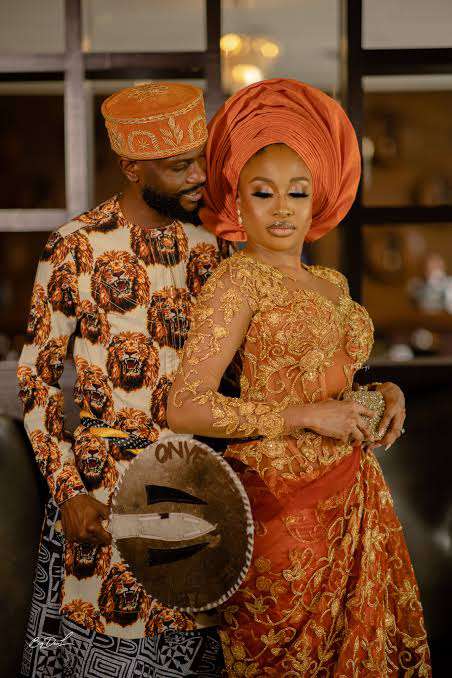
In Igbo culture, the traditional wedding is called Igba Nkwu Nwanyi, which means “the bride’s wine-carrying.” It usually takes place in the bride’s family compound, under large canopies or in a decorated hall.
Key Rituals:
- The Bride’s Entrance:
The bride enters dressed in elegant traditional attire, often wearing coral beads and holding a fan. Her outfit — maybe a rich George wrapper with lace blouse — reflects her family’s pride. Her entrance is met with ululations, cheers, and traditional music. - The Wine-Carrying Ceremony:
This is the highlight. The bride is handed a cup of palm wine by her father and asked to find her groom among the crowd. It’s playful, symbolic, and filled with emotion. Once she finds him, she kneels, offers him the wine, and he drinks. This act represents her public acceptance of him as her husband. - The Bride Price Negotiation:
This is usually done earlier or in private. Elders from both families engage in respectful bargaining over the bride price and list of items requested by the bride’s family. Though symbolic, it reflects respect, not ownership. Some families even return part or all of it, to show that love, not money, is what they value. - Breaking the Kola Nut:
Before the event begins, elders pray over and break kola nuts — a cultural sign of peace and unity.
Attire & Music:
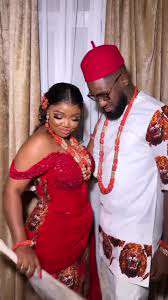
Expect to see Isi Agu tops for men, gele and wrapper sets for women, and energetic drummers beating the ogene or udu. Music is both traditional and joyful — and the dance floor is always open.
Yoruba Traditional Engagement – Alaga Ijoko / Idana
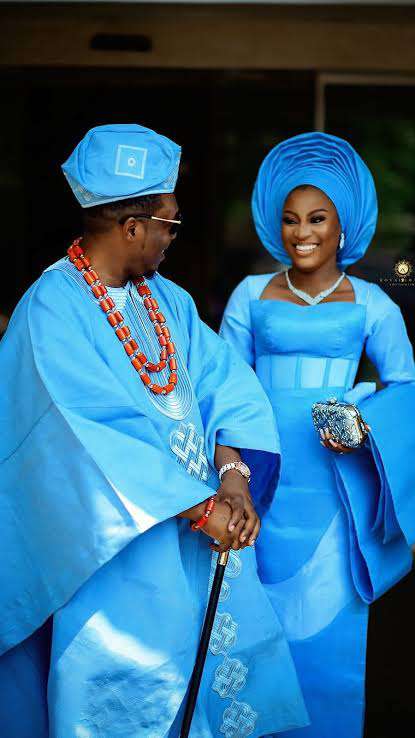
The Yoruba traditional wedding, often called Idana or engagement, is an event of pageantry, humour, and deep tradition. It’s typically held at a well-decorated venue with symbolic colours and a structured program led by the Alaga Ijoko (female MC from bride’s side) and Alaga Iduro (from groom’s side).
Key Rituals:
- Prostration (Idobale):
The groom, often with his groomsmen, lies flat before the bride’s parents — showing respect and asking for their blessing. - Exchange of Proposal Letter:
The groom’s family presents a letter asking for the bride’s hand. The bride’s family replies with their acceptance. It’s formal, but filled with excitement. - Presentation of Gifts:
Items such as yam tubers, sugar, salt, fruit, clothing materials, and a Bible are presented. Each item has a symbolic meaning — from sweetness in the home to fertility and godly values. - The Bride’s Entrance:
Adorned in Aso-Oke, beads, and sometimes a veil, she dances in gracefully. She greets the groom’s family and kneels before her parents and elders. - Ring Exchange & Blessing:
In modern Yoruba engagements, rings are now often exchanged during this ceremony. Elders offer prayers of blessings.
Outfits & Decor:
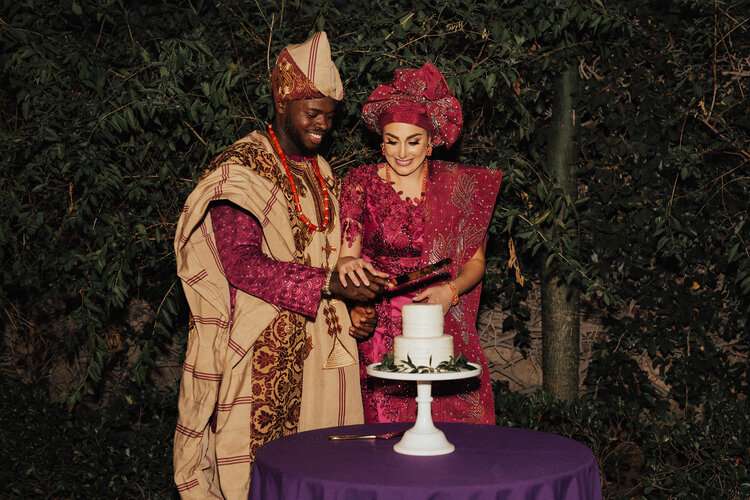
Aso-Ebi (family colour code) dominates. Couples wear coordinated outfits — sometimes regal in purple, gold, or wine. Music is loud, lively, and often includes talking drums that praise the families.
Hausa Traditional Wedding – Aure
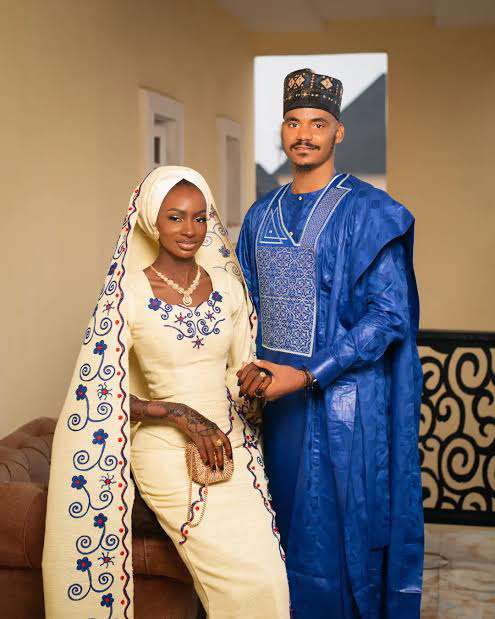
In the North, traditional Hausa weddings are more religious and community-oriented, often spanning multiple days.
Key Elements:
- Introduction (Na Gani Inaso):
Similar to other tribes, the groom declares his interest and makes his intentions known. - Kayan Zance:
This is the gift presentation, where the groom’s family sends items like perfumes, wrappers, and money — usually determined in earlier discussions. - Wedding Fatiha (Nikkah):
This is the Islamic marriage contract conducted in the mosque, in the presence of witnesses. It’s more spiritual than flamboyant. - Kamu Ceremony:
A fun, symbolic event where the bride is “searched for” and “found” by the groom’s family, often requiring negotiation or playful bribes.
Attire & Culture:
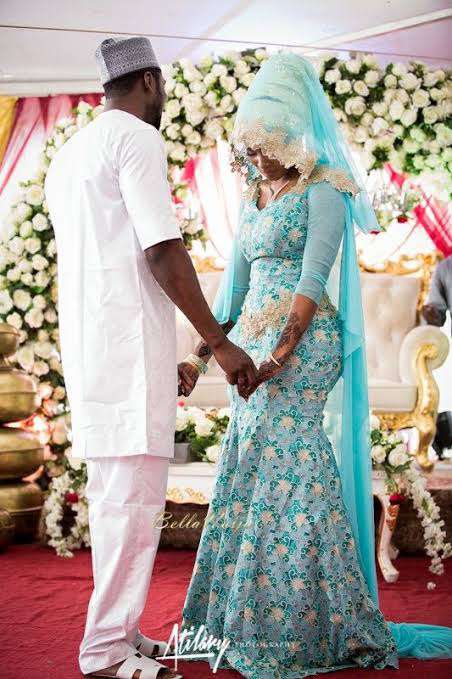
The bride wears richly embroidered Hausa or Fulani gowns, with henna designs on her hands and feet. Drumming and dancing are reserved for the reception, and meals often include tuwo, miyan kuka, and grilled meats.
The Heart of These Ceremonies
Though each ethnic group celebrates differently, one thing unites them all: the emphasis on family, respect, and heritage. The traditional engagement is more than just a party — it’s a spiritual and communal blessing of a lifelong journey.
Efik Traditional Wedding – Ndo / Nkpo Ndo

In Cross River and Akwa Ibom, the Efik people treat marriage ceremonies as royal events. Known for their regal presentation, this ceremony is deeply theatrical and full of symbolism.
Key Rituals:
- Fat-licking Ceremony (Mbopo):
Traditionally, brides underwent “fattening room” preparation — now symbolic. It’s a way to celebrate womanhood, beauty, and readiness for marriage. - Royal Entrance of the Bride:
The bride may appear in multiple outfits, each more stunning than the last — including the Ofod Ukod Anwan, a detailed wrapper and beaded headpiece. She is presented to the groom like a queen. - Cultural Performances:
Traditional Efik dances like Ekombi are performed by maidens. The families may also engage in witty exchanges before handing over the bride. - Gift Exchange:
Similar to other tribes, kola nuts, drinks, wrappers, and other symbolic items are offered.
Tiv Traditional Wedding – Kwase U Ityô
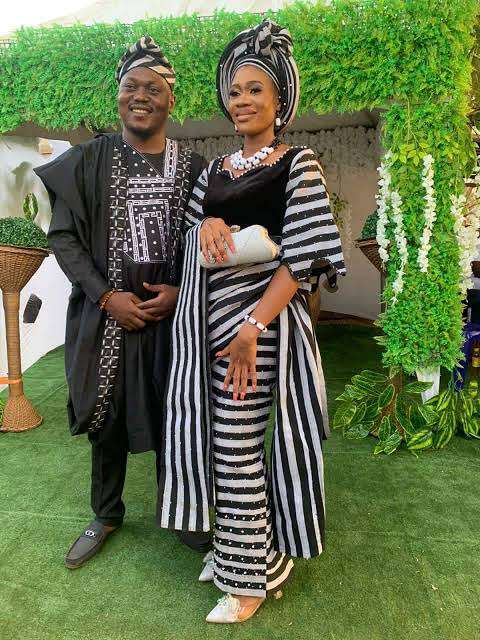
Among the Tiv people of Benue State, marriage ceremonies are deeply rooted in family and ancestral blessings.
Key Rituals:
- Introduction & Formal Acceptance:
Known as Kwase U Ityô, the man’s family visits the woman’s home to state their intention. If accepted, preparation begins. - Bride Price & Exchange of Gifts:
Includes items like yams, local drinks, tobacco, or livestock. These are less commercial and more symbolic of family agreement. - Cultural Dressing:
The Tiv pride themselves on their signature black-and-white striped fabric called Anger (pronounced an-gair). Both bride and groom wear variations of this on the wedding day. - Traditional Dance & Feast:
The Swange dance is a highlight, performed by groups in graceful sways that echo Tiv rhythm and spirit.
Urhobo Traditional Wedding – Uloho
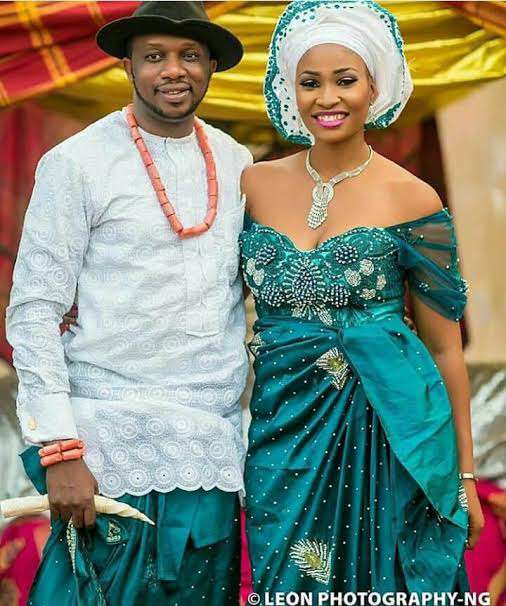
In Delta State, Urhobo weddings are elegant events that blend Christianity with ancient customs.
Key Rituals:
- Introduction Visit (Uloho):
The groom’s family pays a visit with gifts like drinks, food, and money to express their interest. A bride price list is issued thereafter. - Bride’s Outing & Recognition:
The bride comes out in colorful traditional attire, sometimes hidden among friends or sisters for the groom to identify. It’s playful and meaningful. - Family Prayers & Libation:
Elders offer libations with gin or palm wine, calling on ancestors for blessings. - Music & Celebration:
The Urhobo dance style is slow, rhythmic, and expressive, usually accompanied by talking drums and praise chants for the bride and groom.
A Tapestry of Traditions
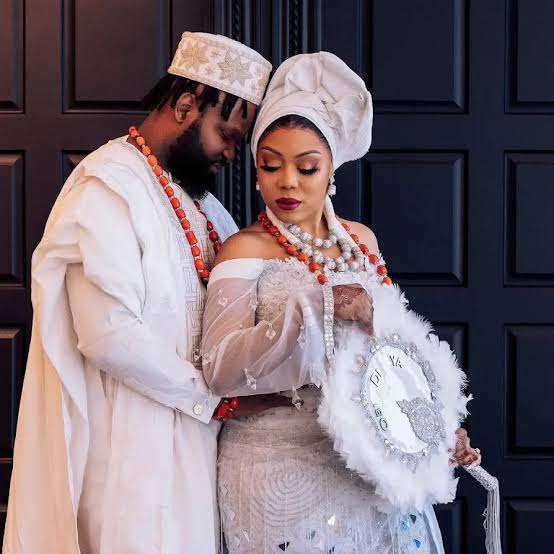
Despite Nigeria’s vast diversity, these ceremonies share key values:
- Respect for elders
- Family involvement
- Symbolism in gifts and rituals
- Celebration of culture and identity
They may differ in attire, language, and sequence, but whether it’s the Igbo’s wine carrying, the Efik’s royal processions, or the Tiv’s Swange dance, each tradition holds a deep emotional and cultural weight.
These are not just weddings — they’re rituals of belonging, where two individuals are woven into a broader family and cultural fabric.
The Role of Key Figures
A Nigerian traditional wedding is never a solo affair, not a one man business. It’s not just about the bride and groom — it’s a carefully choreographed cultural performance where key figures from both families and the community play vital roles. These people guide the process, uphold traditions, and ensure the day flows with meaning and joy.
Let’s look at some of the central figures and what they do.
The Alaga Ijoko & Alaga Iduro (Yoruba MCs)
In Yoruba traditional engagements, the event is usually hosted and directed by two ceremonial MCs:
- Alaga Ijoko (Bride’s family rep)
- Alaga Iduro (Groom’s family rep)
These are typically older women with deep knowledge of Yoruba customs. But they’re not just MCs — they’re performers, negotiators, and entertainers. Through singing, playful banter, and even mock arguments, they guide the rituals and ensure both families follow protocol. Their words are often poetic, humorous, and full of cultural wisdom.
They also:
- Introduce the families
- Request and announce the bride price
- Prompt the groom and his men to prostrate (dobale)
- Announce when the bride makes her entrance
Without them, the ceremony would lose its spark and cultural rhythm.
The Elders & Family Representatives
In all tribes, elderly family members play crucial roles.
- They negotiate and accept the bride price
- They bless the union
- They offer prayers on behalf of ancestors and the living
- They serve as cultural gatekeepers, ensuring traditions are followed respectfully
Among the Igbo, the bride’s father or uncle presents her to the groom’s family after confirming she accepts the proposal.
Among the Hausa, male elders often handle the wedding contract (Fatiha), acting as witnesses and giving the union religious legitimacy.
The Bride’s Aunties & Elder Women
These women — aunties, older cousins, respected family friends — are the emotional and ceremonial backbone of many weddings. They:
- Dress and prepare the bride behind the scenes
- Teach her the significance of each ritual
- Walk with her or dance her in during her grand entrance
- Give her emotional strength with words like:
“You are leaving your mother’s house, but not her love.”
In Efik and Urhobo weddings, these women are also key in the playful hiding of the bride, guiding her out at the right time with flair and drama.
Parents of the Couple
The parents are more than honored guests — they’re central pillars.
- The bride’s parents host and represent her lineage
- The groom’s parents request and offer blessings for her to join their home
- They receive and respond to gifts
- In some traditions (e.g., Tiv, Igala), they even have final say on the union’s approval
Their presence symbolizes unity between two lineages, not just two lovers.
Friends, Cousins, and Extended Family
Don’t underestimate the role of cousins, siblings, and friends — especially “aso-ebi squads” in Yoruba culture or “support teams” in Igbo and Hausa traditions. They:
- Help with logistics
- Dance and hype the couple
- Represent their age group or generation
- Serve as emotional support and energetic backup
They are the ones who fill the room with joy, laughter, and Instagram-worthy moments.
Religious & Community Leaders (in some tribes)
Among the Hausa and Fulani, Islamic clerics (Mallams) conduct the marriage contract and prayers. Among Christians (Igbo, Yoruba, etc.), pastors or elders may also be asked to pray or give short blessings — especially where tradition meets modern faith.
In Summary

Everyone has a role to play. A Nigerian traditional wedding isn’t about two people standing alone — it’s a full cultural performance, where elders lead, mothers cry tears of joy, MCs sing and joke, and friends dance with reckless happiness.
It’s this community-centered energy that makes the celebration feel less like a ceremony and more like a living, breathing tradition.
Symbolism & Meaning Behind the Rituals
At first glance, Nigerian traditional weddings may seem like just colourful festivities — with vibrant clothes, loud music, plenty of dancing, and an endless stream of food. But beneath all the celebration lies a world of deep symbolism. Every gesture, item, and moment carries meaning rooted in ancestral values, community wisdom, and family unity.
Let’s break down the hidden messages behind some of the most cherished rituals.
Breaking the Kola Nut – Unity & Blessing
In many ethnic groups, especially among the Igbo, Urhobo, and parts of the South-South, the ceremony begins with the breaking of the kola nut. But this is not just a snack — it’s a sacred act of unity.
- The kola nut is prayed over by an elder or spiritual leader.
- It symbolizes peace, hospitality, and collective agreement.
- Sharing it among the guests means: “We are one. Let there be no division.”
It’s also a way to call on ancestral spirits and blessings from above to witness and honor the union.
The Wine-Carrying (Igbo) – The Bride’s Public Choice
This ritual in Igbo weddings is as emotional as it is symbolic.
- The bride is handed a cup of palm wine by her father.
- She searches through the crowd to find her groom and offer him the wine.
- Once he accepts and drinks, it means: “I choose you. In front of my family, I accept you as my husband.”
It’s a public declaration of love, trust, and commitment — powerful and unforgettable.
Bride Price – Appreciation, Not Ownership
Often misunderstood, the bride price (also known as “dowry” in some regions) is not a purchase.
In Nigerian tradition, especially among the Yoruba, Igbo, Hausa, Tiv, and Efik, the bride price is:
- A token of respect and appreciation to the bride’s family.
- A way of saying: “Thank you for raising this woman with love and values.”
- A symbolic gesture that marks the formal union of two families.
In some cases, families may return the bride price partially or completely, reinforcing that the marriage is not about money, but love and respect.
Prostration / Kneeling – Respect & Humility
Among the Yoruba, one of the most touching scenes is when the groom and his groomsmen prostrate flat on the ground before the bride’s parents.
- It’s a cultural way of saying: “We honour you. We are humble. We come with peace.”
The bride, in turn, kneels before her in-laws, showing she is ready to honor and join her new family.
In both cases, this act reflects:
- Reverence for elders
- Willingness to serve and love
- Acknowledgement of tradition
Presentation of Gifts – Symbolic Messages
The items exchanged during the ceremony — like yam tubers, salt, honey, wrappers, drinks — are not just random gifts. Each one sends a subtle but meaningful message:
- Yams – Fertility and prosperity
- Salt – Preservation and flavor in the marriage
- Honey/Sugar – Sweetness and peace
- Palm oil – Wealth and blessing
- Bible or Qur’an – Spiritual foundation for the union
- Wrapper and fabric – Covering and beauty
Even when modern items like suitcases or money are added, the traditional meanings still hold.
Dance – Celebration & Community Unity
The dance segments — whether it’s Igbo’s upbeat rhythms, Yoruba’s bata drums, or Tiv’s graceful Swange — are more than entertainment. They:
- Signal the joy of unity
- Bring together young and old in shared happiness
- Allow both families to mingle, bond, and celebrate openly
The bride and groom’s first dance, escorted by their friends, is symbolic of their first joint step into married life.
Multiple Outfits – Identity & Pride
Changing outfits during a wedding is not just about style — it’s a showcase of roots. A bride may wear:
- Her tribe’s signature fabric first
- Then switch into her husband’s tribe’s outfit — a symbolic message of unity across cultural lines
Each look says: “I represent tradition. I carry culture with pride.”
Libation & Prayers – Connecting to Ancestors
In Urhobo, Igala, and Edo ceremonies — and even in some Yoruba weddings — elders pour palm wine or gin on the ground and pray to the ancestors.
This act:
- Invites spiritual protection
- Honors those who came before
- Seals the union with ancestral blessings
It’s deeply rooted in African spirituality and lineage pride.
Why These Rituals Matter
In a world rapidly modernizing, these rituals are living symbols of the values Nigeria holds dear:
- Family unity over individualism
- Respect for elders over youthful arrogance
- Community celebration over private affairs
- Spiritual grounding over just legal documentation
They’re not just beautiful traditions — they are reminders of who we are, where we come from, and the wisdom passed down through generations.
The Feast & Celebration
Once the formalities are done — the introductions, the rituals, the blessings — it’s time for what many guests have truly been waiting for: the feast and celebration. If the earlier parts of the ceremony reflect Nigeria’s rich traditions, this part brings them alive in full colour, sound, taste, and movement.
This is not just a party. It’s a public declaration of joy, an opportunity to honour guests, show hospitality, and celebrate the union in the grandest way possible.
Traditional Foods – A Table Full of Culture
Food is a central language of love and celebration in Nigerian culture. And at traditional weddings, the menu is not just diverse — it’s generous, symbolic, and deeply satisfying.
Depending on the tribe, region, or family background, you might find:
- Igbo weddings:
- Ofe nsala (white soup)
- Ofe akwu (palm nut soup)
- Ofe Ede (coco-yam soup)
- Fufu, jollof rice, goat meat, and nkwobi
- Yoruba weddings:
- Amala, ewedu, and gbegiri
- Ofada rice with spicy stew
- Moi moi, fried plantains, and assorted meats
- Hausa weddings:
- Tuwo shinkafa with miyan kuka or miyan taushe
- Suya, masa (rice cake), and fura da nono
- Light sweet dishes served in decorated trays
- Efik weddings:
- Afang soup, edikang ikong, ekpang nkukwo
- Served with pounded yam or fufu
- Tiv & Middle Belt weddings:
- Local rice dishes, pounded yam, zogale (moringa salad), bush meat delicacies
There’s always something for everyone, and the portions? Let’s just say no guest leaves hungry.
Drinks & Toasts – Pouring Out Joy
From palm wine and zobo to chapman, malt, and fruit juices, drinks flow freely — often as part of symbolic offerings to elders or in toasts to the couple.
In some cultures:
- The first cup of palm wine is shared by the couple.
- Elders pour small drinks to the ground in libation to ancestors.
Where Western traditions have champagne toasts, Nigerian weddings raise cups with a chorus of:
“Long life, fruitfulness, and many children!”
Photography & Videography – Capturing the Heritage
In today’s weddings, the media team is almost as important as the caterers. Photographers and videographers are hired to:
- Capture every moment — from the bride’s makeup session to the last dance
- Document every guest in their aso-ebi (matching fabric)
- Showcase the food, outfits, gifts, and rituals
Photos are not just keepsakes. They are digital heirlooms, proof of a beautiful day rooted in heritage.
Most families even livestream the ceremony for relatives abroad or those who couldn’t attend.
Music & Dancing – Energy in Motion
The celebration truly comes alive when the drums roll and feet hit the dance floor.
- Live bands or traditional groups bring local rhythms to life.
- Yoruba talking drums
- Igbo ogene and ekwe
- Hausa kalangu drums
- Efik and Tiv cultural dance teams
- The bride and groom are ushered in with praise-singing, sprays of money, and a sea of dancers.
- There’s almost always a moment when elderly aunties take over the floor — dancing with grace, humour, and unspoken cultural depth.
- Children and teens join in too, turning the dance floor into a symbol of intergenerational joy.
In fact, in many weddings, money-spraying is not seen as bragging — it’s a way of blessing the couple, of saying:
“May money flow for you like this, all your life.”
Entertainment, Costume Changes & Surprises
Many couples now include:
- Multiple outfit changes — sometimes 3 or 4!
- Dance-offs, games, or couples trivia
- Traditional drama or masquerade performances (especially in Igbo, Yoruba, or Benin settings)
- Surprise performances by local musicians or cultural troupes
Though not part of old tradition style but they uniquely add different aura and tone to the ceremony.
It’s all part of telling the love story — not just of two people, but of their roots, their people, and their future.
The Spirit of Community
At its heart, this part of the wedding reminds everyone of something important:
Marriage is not just between two people. It’s a union of families, tribes, villages — and generations.
The feast is where:
- Old wounds are healed over shared food.
- New friendships are made through dancing.
- Joy is poured out, not just for the couple, but for the entire community.
Modern Touches & Enduring Traditions
While Nigerian traditional weddings remain deeply rooted in heritage, there’s no denying that the modern world has left its own imprint. From custom hashtags to drone videography, today’s weddings are a vibrant blend of age-old customs and contemporary creativity.
But here’s the beauty — instead of replacing our traditions, modern elements often enhance the storytelling, allowing younger generations to express love and culture in bold new ways.
Pre-Wedding Shoots – Capturing the Journey
Gone are the days when the first public photo of a couple appeared on their wedding day. Now, most couples begin the celebration early with:
- Pre-wedding photo sessions in coordinated outfits or themed settings
- Love story videos that showcase how they met and what they love about each other
- Behind-the-scenes shots shared on social media
These moments allow couples to document their journey and set the tone for their wedding celebrations.
Social Media & Hashtags – Sharing Culture with the World
Weddings now trend online before they even happen. Couples create custom hashtags like #ChidinmaWedsKunle2025 or #AureOfLove, allowing guests to follow and share the event in real time.
- Facebook live streams
- Instagram reels of the bride’s grand entrance
- TikTok dance challenges with the wedding squad
All of these create a digital village that mirrors the physical community at the event.
Even for those in the diaspora, this means no one is left out.
Lavish Decor & Event Planners – Tradition Meets Class
While older weddings might have been planned by family members alone, many couples today hire professional event planners to help bring their dream wedding to life.
Modern weddings often include:
- Custom decor themes: rustic Igbo village, royal Yoruba palace, Fulani desert elegance
- Floral arches, custom dance floors, LED lights, and laser shows
- Modern seating charts, menus, and sometimes even ticketed entry
Despite these luxuries, the core traditional rituals — kola nut breaking, wine carrying, prostration — are still honoured.
Fashion Evolution – Heritage, Reimagined
Modern brides and grooms are blending styles in exciting ways:
- A Yoruba bride might wear a modern off-shoulder Aso-Oke gown with Swarovski crystals
- An Igbo groom may rock Isi Agu with designer sneakers
- Brides switch between beaded headpieces, lace veils, and bridal gele
- Some even wear their partner’s traditional attire to show unity
It’s a fashion-forward celebration of cultural pride.
Inter-Tribal & Inter-Faith Marriages – Love Beyond Borders
Today’s Nigeria is more connected than ever. Traditional weddings now frequently unite:
- Igbo and Yoruba
- Efik and Hausa
- Christian and Muslim families
In such cases, couples often combine rituals — hosting two separate ceremonies or blending elements into one seamless event.
This shows that culture is not static. It grows, adapts, and includes — without losing its soul.
What Hasn’t Changed?
For all the modern additions, some things remain untouched:
- The respect for elders
- The symbolism of rituals
- The importance of family approval
- The power of community celebration
- The shared food, music, and prayers
No matter how glamorous the venue or how viral the hashtag, Nigerian traditional weddings still revolve around love, legacy, and unity.
Conclusion: Preserving the Soul of Our Culture
A Nigerian traditional wedding is not just an event. It’s a living archive of who we are — our values, beliefs, and beauty as a people. It brings generations together, binds families in love, and reminds us of the strength in community.
As the world changes, we carry our traditions forward — not as burdens, but as gifts to be shared, celebrated, and passed on.
Whether you’re preparing to host one, attend one, or just admire from afar — know this:
Every drumbeat, every dance step, every bite of jollof at a traditional Nigerian wedding is a declaration that our heritage is alive and thriving.
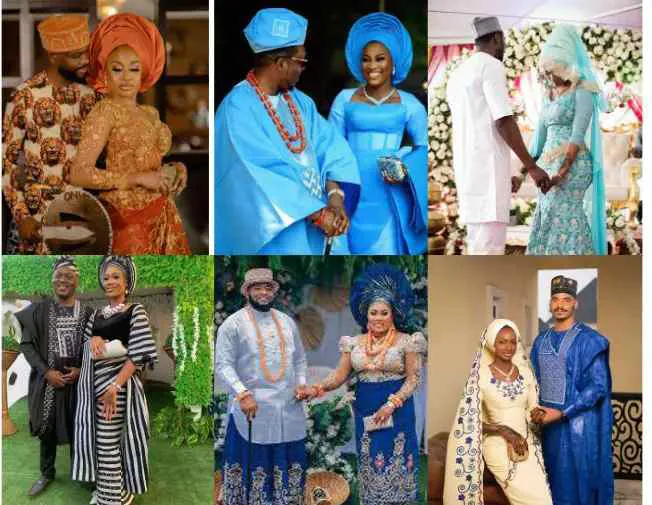
A: A Nigerian traditional wedding is more than just a ceremony — it’s a cultural celebration that unites two families and honors ancestral values. Each ritual, from the kola nut to the bride price, reflects respect, unity, and the importance of family in Nigerian marriage traditions.
Q: How does an Igbo traditional wedding ceremony (Igba Nkwu) work?
A: In an Igbo traditional wedding, also known as Igba Nkwu Nwanyi, the bride publicly offers palm wine to her groom, symbolizing her acceptance. The ceremony includes bride price negotiation, breaking of kola nuts, and vibrant dances — all set within the bride’s family compound.
Q: What is the role of the Alaga Ijoko in a Yoruba traditional wedding?
A: The Alaga Ijoko is a respected female elder who acts as the MC for Yoruba engagement ceremonies. She guides the rituals, manages family interactions, and adds humor and cultural flavor through songs, proverbs, and playful banter, making the Idana both structured and entertaining.
Q: Are Hausa weddings different from Yoruba and Igbo weddings?
A: Yes. Hausa traditional weddings are often more religious and modest, with the central event being the Wedding Fatiha, an Islamic contract conducted at the mosque. However, ceremonies like Kamu and Kayan Zance still offer cultural flair with gift-giving and family bonding.
Q: How have Nigerian traditional weddings blended with modern trends?
A: Today’s Nigerian traditional weddings often include modern elements like pre-wedding shoots, designer Aso-Ebi, social media hashtags, and professional event planners. Despite these updates, key traditions — like wine carrying, prostration, and cultural blessings — remain firmly in place.

